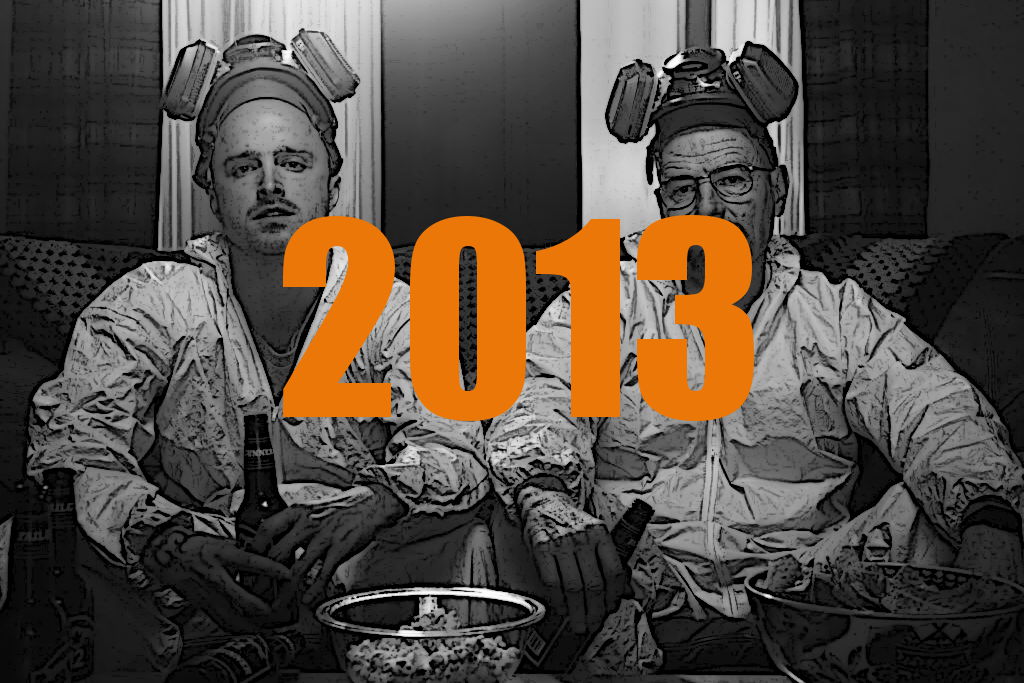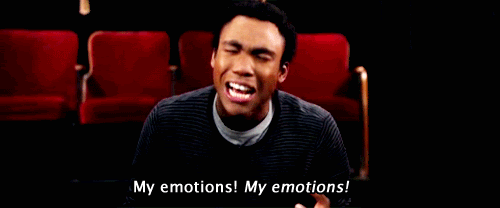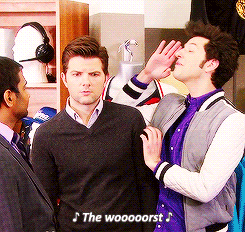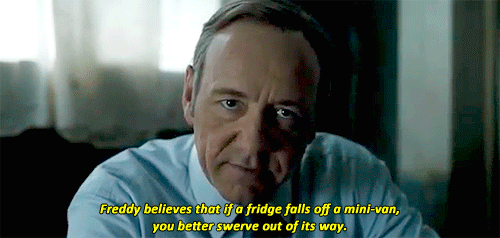Anti-Heroes, GIF-Ability, And Other TV Trends Of 2013
Did you notice more than a few things in common between the major shows this year? You're not alone. (Spoiler alert!)

Ranking television is hard, and a little ridiculous. Trying to decide the better out of Parks and Recreation and Hannibal is like comparing a plate of bacon, waffles and whipped cream to a plate of human organs and whipped cream. Big moments stood out, from Red Weddings to dead Doctor Reids, and new fan favourites emerged (Crazy Eyes!) while others kind of faded away (sorry Ja’mie). But television tends to follow trends, and so there are overlaps and opposing viewpoints to be found in plenty of this year’s offerings.
What will we remember from television in 2013? Here are a few ideas (and as few spoilers as possible).
–
The Year We All Got Sick Of The Anti-Hero (And The Anti-Heroes Got Sick Of Themselves)
If you read much television commentary, then it will have been brought to your attention that we’re leaving a Golden Age of Television. And just as the first Golden Age of Comics was full of carbon copy superheroes, with minimal differences in their power sets and cape colours, so too was this age defined by its similar anti-hero protagonists: gangsters, crooked cops, drug dealers, serial killers, adulterers, drunks, and just generally screwed up dudes, one and all.
If we really are entering a new period with a different story to tell, I say good riddance to yesteryear.
Ray Donovan, Low Winter Sun and Mob City, full of grey-hatted heroes and little-to-no nuance, have seemingly come and gone without much impact. Other shows that chose to dabble in this darkness seemed to drift towards deeper stories. Justified, for instance, asked not whether U.S. Marshal Raylan Givens was a badder motherfucker than all he faced; rather, it challenged the quick-draw drawler to define himself as something other than the criminals he went up against. Meanwhile the most complicated woman on television, Carrie Mathison, was drowned in twisting plots by the ever-more-complicated Homeland, which now seems to deal less with the CIA and NSA and more with the WTF and AYS.
Boardwalk Empire’s sprawl finally paid off this year: the villain of the season (a fantastically oily Jeffrey Wright) was not an antagonist for Steve Buscemi’s cardboard power player Nucky Thompson, but instead faced off with Chalky White (Michael Kenneth Williams) and allowed the show to explore intra-racial politics in the 1920s. Don Draper, after putting himself and viewers through a wringer of repetitive behaviour, finally got sick of his own shit and came clean to his colleagues and himself about his shitty past. Mad Men might finally be headed up by a sane guy.

Eastbound and Down took on the anti-hero in its brilliant final season, dropping the ex-pitcher Kenny Powers in suburbia. It hilariously showed that anyone sick of his wife, children and the 9-to-5 is probably driven to terrible behaviour by an asshole-ish ego rather than any white, middle-class, male ennui.
And the creators of Breaking Bad seemed to finally break their silence on the faction of its fan base that is straight up misogynist. In the third final episode, Walter White phones his wife and calls her a bitch — the label that every angry YouTube account owner and their woman-hating dog had levelled at the perhaps complicated, perhaps poorly drawn character for years. Great writers weighed in on the scene, and online commenters (believe it or not) reiterated whatever thoughts they already had about Skyler-the-nagging/abused-spouse. In one phone call, Walt berates his wife with every bottled up emotion and threat he has, cuts her free from criminal charges, and admits his complicity in a death to himself and his family. It was the greyest and grimmest moment that the show dredged up all season.
–
The Year That Network Comedies Became GIF Factories
I love GIFs. Come over to my house/Facebook page sometime and I can show you some of them! Despite my affection for the dominant art form of our era, I have a horrible creeping feeling that our best sitcom writers are too web-focused, serving up comedy ripe for sharabiltiy, meme-ification and ‘shipping. Does every joke now have to land in such a Tumblr-ready way? One-liners are one thing, catch phrases are another; a half-hour of loudly shouted non-sequitors is perhaps not the best model for sustainable entertainment.




New Girl became a shouty, relationship-entangled hassle, a show that leans heavily on the charisma of its actors rather than coming up with plot lines that avoid hoary hi-jinks and tired farce. Truly the Friends of a new generation. Community, meanwhile, disappointed true believers by simply continuing to make the same referential, self-referential, meta-self-referential gags it had been in the previous four seasons.
Happy Endings left this earth at possibly just the right time, before we tired of its hyper gag-fest, pun-strewn, mayhem, while Arrested Development returned and tested the limits of fandom, story-telling and television distribution platforms. It felt a little like creator Mitch Hurwitz had heard the praise delivered to the show’s use of foreshadowing and callback, but missed the part where we appreciated its jokes. Thankfully it was still its own completely strange bird (ostrich), and the (almost) stand-alone episodes featuring George Michael and Maeby were some of the funniest. Enlightened burned bright and briefly. And so so sadly, both in its content and brevity.. Surely we could have GIF’d a few more of Amy Jellicoe’s crying jags and started a meme?

Thank goodness then for Girls and Please Like Me, creating nuanced, weird, emotional comedy that we can all argue about (Not attractive enough! Too gay!) for years to come.
Parks and Recreation, once a shining light in funny, emotional story-telling, managed to both progress many of its characters through huge life-changes while digging them deeper into caricatured ruts. Some of the lessons these humble government employees learnt (“Your girlfriend will like you for you, not just because you win her a giant teddy bear at the arcade!”) were seemingly lifted from a ’90s Nickelodeon afternoon special.
Still, this little piece of Seussian brilliance made me laugh for hours.
–
The Year We Maybe Started Killing Young Women To Explore Ideas, Rather Than Titillate
It took me a while to get to Top Of The Lake. I was burnt out on the seemingly similar The Killing, the last small-community-struck-by-tragedy soapy sob fest, and every other show where young women are killed as a plot point. Idris Elba’s charisma couldn’t convince me to watch a different person get sadistically tortured every week on Luther. Similarly, critically endorsed Broadchurch and The Fall didn’t make it into my viewing queue.
But Top of the Lake used the missing girl trope to explore ongoing trauma, showing that the impact of abuse doesn’t stop when the case is closed. Elizabeth Moss is fantastic (if accent challenged) as the lead detective, and her ability to play with how a person absorbs information, and then refracts this through unique experience, made her character’s past as compelling as the show’s central mysteries. The gendered power clash between meth clan leader Peter Mulan and reluctant guru Holly Hunter was another highlight, and Jane Campion added some auteur affect behind the camera.
I doubt anyone thought we needed another iteration of Thomas Harris’ famed cannibal, but Hannibal is the most astounding looking show on television. Its woozy, dreamscape visuals underline the physical and emotional disturbances of the protagonists’ minds, to beautiful effect. The murders on this show are so far removed from reality (human totem poles and corpse-fed mushroom farms were among the series’ most shocking crime scenes) that they’re almost expressive artworks used to understand a damaged psyche. It’s obvious why you can find endless fan-created music videos online – the imagery is as exciting as anything that came out of MTV’s hey day, and the acting (especially Hugh Dancy as profiler Will Graham, and Mads Mikkelson as Hannibal Lector) is equally excellent.
–
The Year That Politics Oozed Into Everything
In a year full of leadership spills, thrills and electoral chills, politics was everywhere on our screens. I wish Micallef’s Mad as Hell had eeked out an election special or two – it would have been fantastic to hear from the dopplegangered oppositional party spokespeople, and to not have heard from the perpetually interrupted talking head from the independents. At least one more round of “Barnaby Joyce, is that the Chatanooga Choo-Choo” before all this misery set in.
Instead, The Newsroom was on hand to lecture us about a US election that happened a couple of years ago (spoiler alert: America probably made the right choice), Borgen provided an intermittently interesting view of a European, female-led democracy, and House of Cards was all slick production values, shady political deals, and endless metaphors about just how a Georgian pig pat was like a Vice Presidential candidacy. (You can start at the snout or start at the tail, but either way you’re gonna get your hand on the bacon. No, I don’t know what Kevin Spacey was fourth-wall waffling about either.)

Veep came back for an incredibly strong second season, throwing Julia Louis Dreyfus’ delightfully acerbic Selina Meyer, VP, between a scandal-hungry media and a survival-obsessed administration, as she ramped up to become a political entity. But the show that provided me with the most laughs, gasps, conversations and fights in 2013 was Q&A. And no, I’m not trolling. It was a particularly juicy year to argue upcoming policy and exhaustedly reported political dramas. Between the stirring moments, like when a sitting Australian Prime Minister stood up for marriage equality, the lighter trifles (like when Christopher Pine outed himself as a major music noob), and the conspicuous non-appearances, this was the show I actually made an effort to watch on an actual television.
–
Matt Roden helps kids tell stories by day at the Sydney Story Factory, and by night helps adults admit to stupidity by co-running Confession Booth and TOD Talks. He is 2SER’s resident TV critic — each Tuesday morning at 8.20am — and his illustration and design work can be seen here.